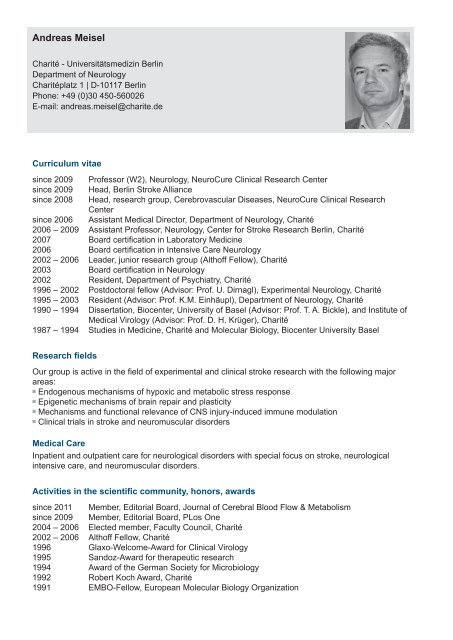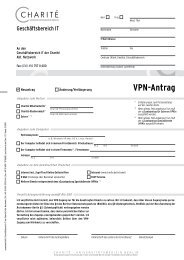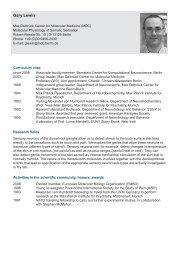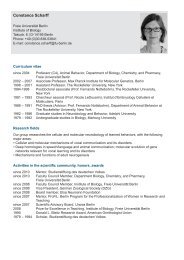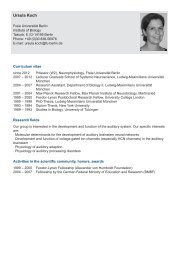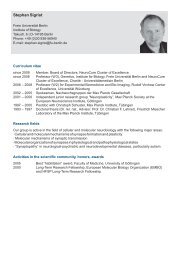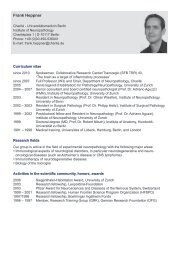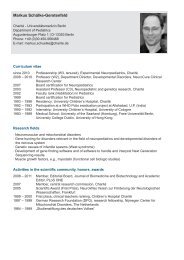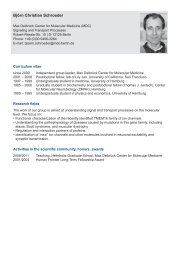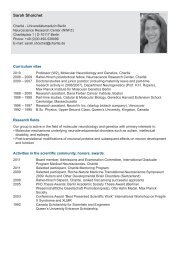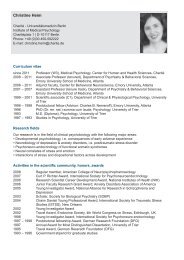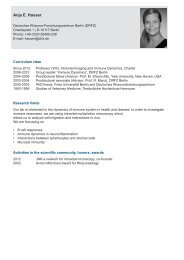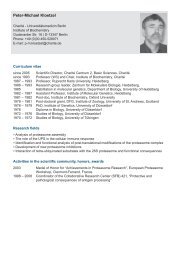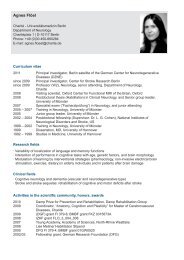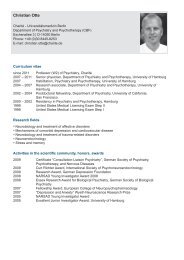Andreas Meisel - NeuroCure
Andreas Meisel - NeuroCure
Andreas Meisel - NeuroCure
Create successful ePaper yourself
Turn your PDF publications into a flip-book with our unique Google optimized e-Paper software.
<strong>Andreas</strong> <strong>Meisel</strong><br />
Charité - Universitätsmedizin Berlin<br />
Department of Neurology<br />
Charitéplatz 1 | D-10117 Berlin<br />
Phone: +49 (0)30 450-560026<br />
E-mail: andreas.meisel@charite.de<br />
Curriculum vitae<br />
since 2009 Professor (W2), Neurology, <strong>NeuroCure</strong> Clinical Research Center<br />
since 2009 Head, Berlin Stroke Alliance<br />
since 2008 Head, research group, Cerebrovascular Diseases, <strong>NeuroCure</strong> Clinical Research<br />
Center<br />
since 2006 Assistant Medical Director, Department of Neurology, Charité<br />
2006 – 2009 Assistant Professor, Neurology, Center for Stroke Research Berlin, Charité<br />
2007 Board certification in Laboratory Medicine<br />
2006 Board certification in Intensive Care Neurology<br />
2002 – 2006 Leader, junior research group (Althoff Fellow), Charité<br />
2003 Board certification in Neurology<br />
2002 Resident, Department of Psychiatry, Charité<br />
1996 – 2002 Postdoctoral fellow (Advisor: Prof. U. Dirnagl), Experimental Neurology, Charité<br />
1995 – 2003 Resident (Advisor: Prof. K.M. Einhäupl), Department of Neurology, Charité<br />
1990 – 1994 Dissertation, Biocenter, University of Basel (Advisor: Prof. T. A. Bickle), and Institute of<br />
Medical Virology (Advisor: Prof. D. H. Krüger), Charité<br />
1987 – 1994 Studies in Medicine, Charité and Molecular Biology, Biocenter University Basel<br />
Research fields<br />
Our group is active in the field of experimental and clinical stroke research with the following major<br />
areas:<br />
n Endogenous mechanisms of hypoxic and metabolic stress response<br />
n Epigenetic mechanisms of brain repair and plasticity<br />
n Mechanisms and functional relevance of CNS injury-induced immune modulation<br />
n Clinical trials in stroke and neuromuscular disorders<br />
Medical Care<br />
Inpatient and outpatient care for neurological disorders with special focus on stroke, neurological<br />
intensive care, and neuromuscular disorders.<br />
Activities in the scientific community, honors, awards<br />
since 2011 Member, Editorial Board, Journal of Cerebral Blood Flow & Metabolism<br />
since 2009 Member, Editorial Board, PLos One<br />
2004 – 2006 Elected member, Faculty Council, Charité<br />
2002 – 2006 Althoff Fellow, Charité<br />
1996 Glaxo-Welcome-Award for Clinical Virology<br />
1995 Sandoz-Award for therapeutic research<br />
1994 Award of the German Society for Microbiology<br />
1992 Robert Koch Award, Charité<br />
1991 EMBO-Fellow, European Molecular Biology Organization
Selected publications<br />
Dirnagl, U, Becker, K and <strong>Meisel</strong>, A. Preconditioning and tolerance against cerebral ischaemia: from<br />
experimental strategies to clinical use. Lancet Neurol. 2009; 8, 398-412.<br />
Harms, H, Prass, K, <strong>Meisel</strong>, C, Klehmet, J, Rogge, W, Drenckhahn, C, Gohler, J, Bereswill, S, Gobel, U,<br />
Wernecke, KD, Wolf, T, Arnold, G, Halle, E, Volk, HD, Dirnagl, U and <strong>Meisel</strong>, A. Preventive antibacterial<br />
therapy in acute ischemic stroke: a randomized controlled trial. PLoS One. 2008; 3, e2158.<br />
Prass, K, Braun, JS, Dirnagl, U, <strong>Meisel</strong>, C and <strong>Meisel</strong>, A. Stroke propagates bacterial aspiration to<br />
pneumonia in a model of cerebral ischemia. Stroke. 2006; 37, 2607-12.<br />
<strong>Meisel</strong>, C, Schwab, JM, Prass, K, <strong>Meisel</strong>, A and Dirnagl, U. Central nervous system injury-induced<br />
immune deficiency syndrome. Nat Rev Neurosci. 2005; 6, 775-86.<br />
<strong>Meisel</strong>, C, Prass, K, Braun, J, Victorov, I, Wolf, T, Megow, D, Halle, E, Volk, HD, Dirnagl, U and <strong>Meisel</strong>, A,<br />
Preventive antibacterial treatment improves the general medical and neurological outcome in a mouse<br />
model of stroke. Stroke. 2004; 35, 2-6.<br />
Prass, K, <strong>Meisel</strong>, C, Hoflich, C, Braun, J, Halle, E, Wolf, T, Ruscher, K, Victorov, IV, Priller, J, Dirnagl,<br />
U, Volk, HD and <strong>Meisel</strong>, A. Stroke-induced immunodeficiency promotes spontaneous bacterial<br />
infections and is mediated by sympathetic activation reversal by poststroke T helper cell type 1-like<br />
immunostimulation. J Exp Med. 2003; 198, 725-36.<br />
Ruscher, K, Freyer, D, Karsch, M, Isaev, N, Megow, D, Sawitzki, B, Priller, J, Dirnagl, U and <strong>Meisel</strong>,<br />
A. Erythropoietin is a paracrine mediator of ischemic tolerance in the brain: evidence from an in vitro<br />
model. J Neurosci. 2002; 22, 10291-301.<br />
Endres, M, <strong>Meisel</strong>, A, Biniszkiewicz, D, Namura, S, Prass, K, Ruscher, K, Lipski, A, Jaenisch, R,<br />
Moskowitz, MA and Dirnagl, U. DNA methyltransferase contributes to delayed ischemic brain injury. J<br />
Neurosci. 2000; 20, 3175-81.<br />
<strong>Meisel</strong>, A, Mackeldanz, P, Bickle, TA, Kruger, DH and Schroeder, C. Type III restriction endonucleases<br />
translocate DNA in a reaction driven by recognition site-specific ATP hydrolysis. EMBO J. 1995; 14,<br />
2958-66.<br />
<strong>Meisel</strong>, A, Bickle, TA, Kruger, DH and Schroeder, C. Type III restriction enzymes need two inversely<br />
oriented recognition sites for DNA cleavage. Nature. 1992; 355, 467-9.


